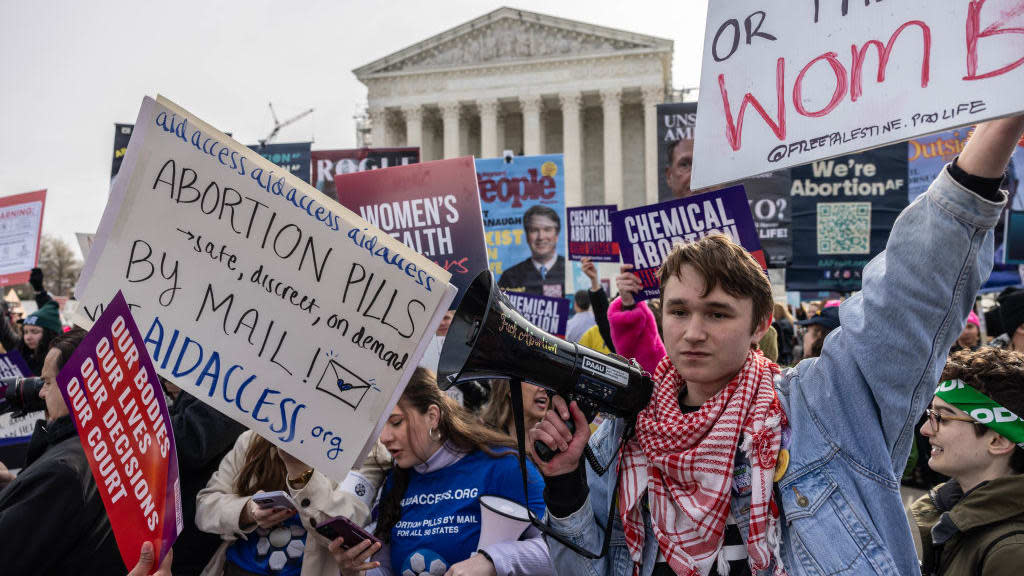SCOTUS Judges Skeptical of Challenge to Mail-Order Abortions

- Oops!Something went wrong.Please try again later.
- Oops!Something went wrong.Please try again later.
- Oops!Something went wrong.Please try again later.
U.S. Supreme Court justices rained down tough questions on a lawyer for a group trying to restrict the distribution of abortion pills Tuesday, in what could be the most monumental case for abortion access since the court overturned Roe v Wade.
Among the most skeptical was conservative Neil Gorsuch, who delivered something of a broadside against the case.
“This case seems like a prime example of turning what could be a small lawsuit into a nationwide legislative assembly on an FDA rule or any other government action,” he said.
In oral arguments, an attorney for the anti-abortion Alliance for Hippocratic Medicine faced off with lawyers for the government and a drug manufacturer over the Food and Drug Administration’s loosening of restrictions around mifepristone, one of two drugs used in a medication abortion.
The alliance argues the FDA did not have adequate evidence to remove the requirement that mifepristone be dispensed in person in 2021, allowing doctors to prescribe and dispense the medication via telemedicine. The FDA and almost every major American medical association disagree.
A key point of contention in Tuesday’s arguments was whether the alliance—a collective of anti-abortion doctors and medical groups whose members do not take, prescribe, or dispense mifepristone—had standing to bring the case at all.
The justices repeatedly questioned alliance lawyer Erin Hawley—the wife of Republican Sen. Josh Hawley—on whether the doctors named in the case had ever been required to treat complications from mifepristone against their will. Both Justice Kentaji Brown Jackson and notoriously anti-abortion Justice Amy Coney Barrett pressed Hawley to find a single example in the testimony of a doctor being forced to do so—something the attorney struggled to do.
Both liberal and conservative justices also questioned whether the remedy the organization sought—restricting access to the drug nationwide—was disproportionate to the harm the doctors might suffer in treating complications. Gorsuch bemoaned the “rash” of federal injunctions issued in recent years, telling Hawley she was “asking us to extend and pursue this relatively remedial course, which this court has never adopted.”
Justices Clarence Thomas and Amy Coney Barrett also had questions for Hawley about standing, including—from Thomas—whether the monetary harm the alliance suffered was sufficient to warrant standing in the case. If the justices rule the organization does not have standing, its entire case would be tossed out.
The justices also had difficult questions for lawyers for the government and the largest producer of the drug, Danco Labs, on the merits of the case. Of particular interest was the Comstock Act, which prohibits the mailing of “obscene” materials—such as drugs used to induce abortions—through the U.S. Postal Service.
Barrett and Justice Brett Kavanuagh also sought assurances from Solicitor General Elizabeth Pregolar, the lead attorney for the government, that existing “conscience protection” laws shield doctors from being forced to treat mifepristone complications against their will. Pregolar said they did.
The FDA approved mifepristone for use in a medication abortion in 2000, with strict limitations around how it could be dispensed. It loosened some of those restrictions in 2016, allowing it to be taken up to 10 weeks into a pregnancy, reducing the number of doctor’s visits needed to obtain it, and expanding the type of provider who can prescribe it.
In 2021, in the midst of the COVID-19 pandemic, the agency temporarily suspended the in-person dispensing requirement, allowing the drugs to be prescribed by phone, video, or messaging app. It made the change permanent later that year.
Medication abortions now account for 63 percent of all abortions in the United States, according to the Guttmacher Institute, and research from the Society of Family Planning found up to 16 percent of all abortions are performed via telehealth. Research has found no difference in the safety and effectiveness of medication abortions prescribed remotely versus in person.
The alliance tried to challenge the FDA’s approval of the drug as a whole when it first filed suit in 2022. The Fifth Circuit Court of Appeals upheld the approval of the drug but ruled that the 2016 and 2021 changes violated the law. The Department of Justice and the maker of the drug appealed that ruling to the Supreme Court.
Reproductive rights groups have warned the case could severely limit access to abortion, especially for women in states with strict gestational limits on the procedure. Advocates for the drug industry, meanwhile, say that the Supreme Court overturning an FDA system could upend the entire drug approval and regulatory system.
“Beyond the threat to our fundamental rights, the very existence of this case puts every other FDA-approved medication at risk of being taken off the market or restricted for political reasons,” Planned Parenthood CEO Alexis McGill Johnson said in a statement. “ We hope that science and evidence prevail, and the Supreme Court rejects this politically motivated effort to make it harder to access abortion.”
A decision on the case is expected in late June.
Get the Daily Beast's biggest scoops and scandals delivered right to your inbox. Sign up now.
Stay informed and gain unlimited access to the Daily Beast's unmatched reporting. Subscribe now.

